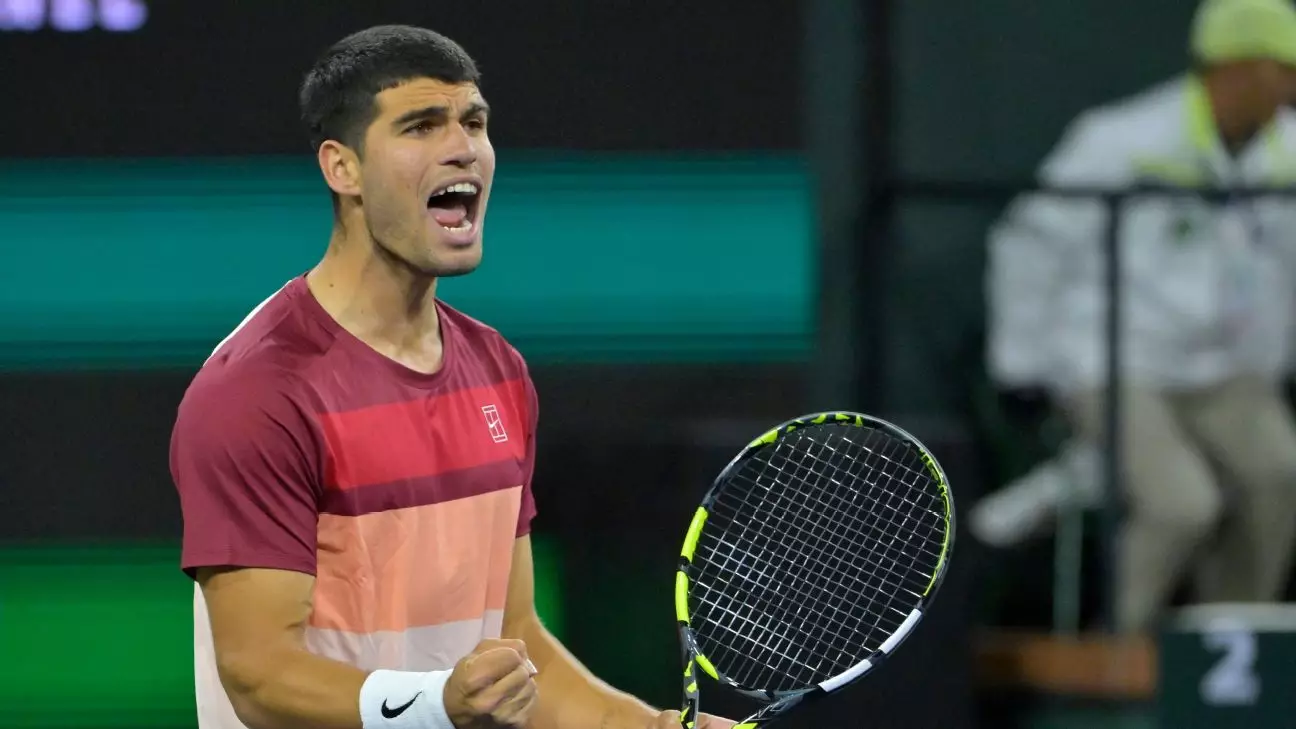Carlos Alcaraz’s performance at the Monte Carlo Masters has once again illuminated his growing reputation as a formidable force in tennis. In a stunning comeback match against Arthur Fils, Alcaraz displayed not only his remarkable skill set but also an indomitable spirit that many champions aspire to embody. At one point, he found himself five points from elimination in the second set and down 3-1 in the final set—situations that would rattle even veteran players. Yet, he rallied back, showcasing his fighting spirit and securing a hard-fought victory with a scoreline of 4-6, 7-5, 6-3 after an exhilarating two and a half hours on the court.
The statistics tell part of the story; Fils, who has proven to be a rising talent, struggled with an astounding 53 unforced errors, marking a crucial factor in Alcaraz’s triumph. Alcaraz, reflecting on his performance, noted his fondness for clay courts, indicating a familiarity that serves him well as he prepares for his French Open title defense. Reaching the semifinals in Monte Carlo for the first time adds another dimension to his illustrious journey, particularly as he faces Alejandro Davidovich Fokina in a highly anticipated all-Spanish match-up.
Fils: Promising Future Shattered by Frustration
It is essential to approach Arthur Fils’ performance with a nuanced perspective. Despite the defeat, his presence in three consecutive Masters quarterfinals indicates profound potential. His explosive start against Alcaraz, pulling to a 3-0 lead, reflected an aggressive strategy that threatened to take the match away from the seasoned Spaniard. However, his inability to convert seven break points in the second set ultimately cost him the match.
This high-pressure environment magnifies a young player’s learning curve, and Fils’ frustration was palpable when he lost control, physically expressing his dissatisfaction by slamming his racket onto the clay. Such moments can be pivotal for a young athlete, teaching resilience in the face of adversity. This experience will indubitably contribute to Fils’ growth, shaping him into a more formidable competitor in future tournaments.
Tsitsipas: The Mystery of Decline
Contrast this with the bewildering fall from grace of defending champion Stefanos Tsitsipas, who was ousted by Lorenzo Musetti in a match that defied all predictions. Initially dominating, Tsitsipas effortlessly claimed the first set 6-1, exhibiting confidence that suggested a repeat of his past successes. However, everything unraveled rapidly thereafter, culminating in a shocking exit.
Notably, Tsitsipas’ serve deteriorated significantly as the match progressed. With less than 50% first serves landing in and seven double faults, the steady foundation upon which he built his early success crumbled, leading him to succumb to Musetti after losing the final two sets 6-3, 6-4. His bewilderment post-match echoes the sentiments of many athletes who grapple with inconsistency: how does one maintain composure and performance under pressure?
Musetti: A New Wave of Emotion
For Musetti, the victory was monumental—a breakthrough not just in advancing to the semifinals but also in celebrating the emotional weight of the moment with tears of joy. This reaction demonstrates the profound impact of competition on athletes, where victories often carry the burden of unfulfilled expectations and the weight of potential.
Facing Alex De Minaur next, who reached the semifinals with a stunning 6-0, 6-0 victory over Grigor Dimitrov, Musetti’s journey illustrates the dual nature of tennis: it is as much about mental fortitude as it is about physical prowess. With Dimitrov’s staggering 23 unforced errors showcasing a litany of mistakes, it becomes clear that every match presents a battleground where consistency and focus reign supreme.
What unites these stories at the Monte Carlo Masters is not merely the technical aptitude of the players, but their human resilience, the emotional stakes, and the monumental weight of expectations that make success all the more thrilling and, at times, elusive.


Leave a Reply